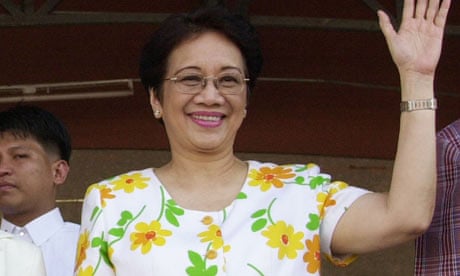The Philippines began 10 days of national mourning today following the death of Corazon Aquino, the former Filipino president whose "people power" movement swept away the dictatorship of Ferdinand Marcos in 1986.
Aquino, who was 76, had spent more than a month in hospital after being diagnosed with advanced colon cancer last year, and had recently refused further treatment. She died in hospital yesterday morning surrounded by her five children, her family said.
Hundreds of Filipinos left flowers and lit candles at her home and the Edsa shrine in Quezon, where many of the people power demonstrations took place, while others held masses and displayed yellow ribbons.
Her body will lie in state in Manila until tomorrow morning, and she will be buried beside her husband at a private ceremony in the capital on Wednesday.
Despite her mixed record in office, Aquino is viewed with widespread affection among Filipinos. The country's armed forces will accord her full military honours during her wake.
White House spokesman Robert Gibbs said Barack Obama was deeply saddened by the news. "Her courage, determination, and moral leadership are an inspiration to us all," Gibbs said.
Aquino's amiable demeanour and trademark bright yellow dresses belied a steely determination to end 20 years of brutal dictatorship under Marcos. In office, her grit also helped her see off seven coup attempts in six years.
Her remarkable rise to power began after her husband, the opposition leader Benigno "Ninoy" Aquino Jr, was assassinated in 1983 as he was preparing to challenge Marcos. Her victory in the 1986 election and her bravery in the face of an attempted attack by her opponents in the days that followed inspired political change around the world, including the fall of communism in eastern Europe.
The Philippines president, Gloria Macapagal Arroyo, paid tribute to the woman many refer to as Aunty Cory, describing her as a national treasure who restored democracy and the rule of law. Aquino remained active in public life after leaving office in 1992, at times joining protests against her successors.
